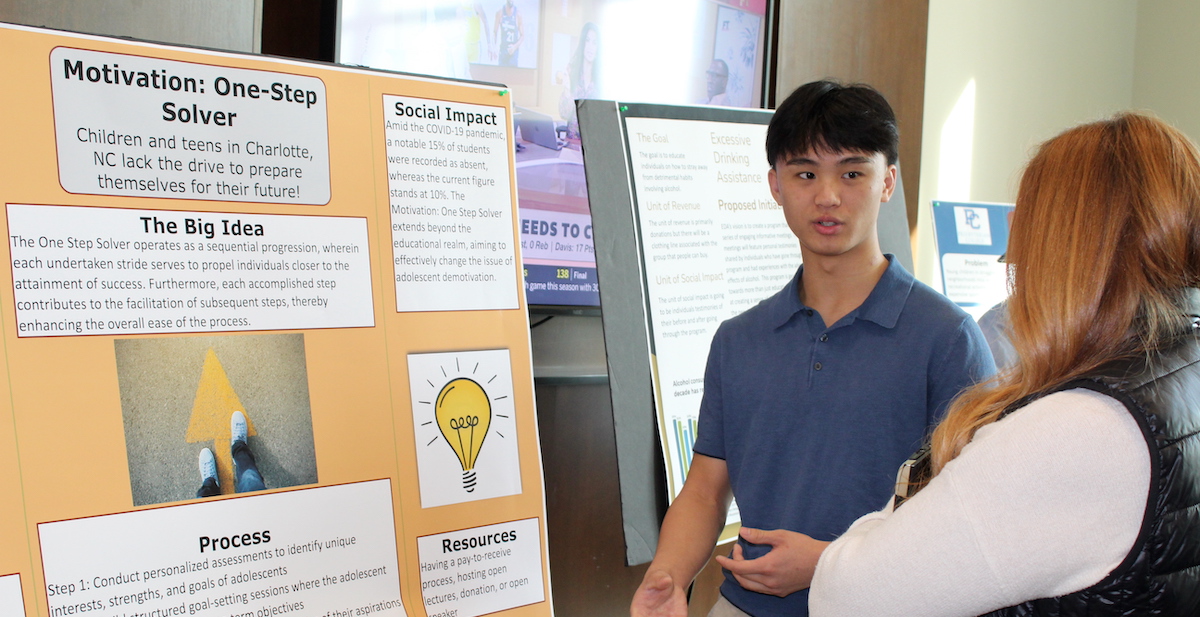First-year students at PC explore service entrepreneurship

A class for first-year students at Presbyterian College found new ways to combat and even fix social problems in their communities.
The class, taught by PC business professor Karen Mattison, allowed students to develop individual business models to solve issues in their hometowns. Designed only for first-year students, the service entrepreneurship class dovetails the college’s commitment to service and its annual Service Entrepreneurship Competition for high school seniors.
Mattison explained that each student was allowed to address any problem and come up with any solution – but they did have to “stress test” their ideas with a plan to measure social impact and sources of revenue to sustain a long-term solution.
While the social entrepreneurship class is one of several first-year exploration courses offered to freshmen, it is the one devoted to PC’s motto, Dum Vivimus Servimus.
“It does support ‘While We Live, We Serve’ because students can think of lots of different ways to venture into service entrepreneurship,” Mattison said. “The hope is that they’re going to create a business that is sustainable and provides a service to the community. That’s really exciting.”
Students found a variety of social problems they hope to address – including homelessness, addiction, poverty, and a lack of opportunities for people in rural areas. Students shared their projects with the campus community at a recent poster symposium to close out the semester.
Angelo Lemb, for example, is a first-year student from France and a Blue Hose men’s soccer team member. Lemb hopes to create opportunities in his native country for young people to access France’s rich cultural heritage – museums, historic places, and galleries.
Torreana Miller, a student from Greer, wants to combat the “pink tax” – the higher price women pay for hygiene products.
“Women’s products are generally 13 percent more expensive than men’s, like razors, soap, and underwear,” she said. “For women living in poverty, that’s a lot each month. I’d like to eventually help by getting people jobs, but at first, I would contact vendors and sponsors to get funding to help them.”
Xupheng Ly, a first-year student from Lancaster, based his project on the premise that success breeds success. Xupheng wants to motivate adolescents to achieve their bigger goals by helping them achieve smaller goals to build skills and confidence.
“I have a lot of cousins – around 10-13 – and they’re always stuck,” he said. “They’re always stuck on their technology. And I hate that for them. I don’t want them to not go anywhere in life; I want them to succeed. I want them to be motivated to have a good life.”
Xupheng said he wants to build a program that takes young people step by step toward their individual goals.
“The more things that you complete, the easier it will be to complete something bigger,” he said. “It’s the little steps that you have to take until you actually eventually reach the big steps.”
Like many students who come to America’s Innovative Service College, Xupheng was intrigued by the idea of learning and serving simultaneously.
“I definitely knew I wanted to do something to help a lot of people,” he said. “I just didn’t know exactly what – I just had to look into it.”
Jianna Branyon is a resident of rural Abbeville County and envisions an after-school tutoring program that helps students boost their GPAs and morale to get into college.
“I know that when I’m succeeding and getting better grades that I like school because I am doing well,” she said. “I know a lot of my friends didn’t go to college because they didn’t have great grades, so I want to build a program to help students get their grades up.”
Like many small, rural communities in South Carolina, Abbeville County has aging schools and little funding. But Branyon said she hopes to find donors to help make her dream a reality. In the meantime, she said PC is the right place to shape her vision.
“I was already sold on going to USC until I got my scholarship package from PC and came on a tour,” she said. “I kept on seeing the banners that said, ‘America’s Innovative Service College,’ and I was like, “Yep, this is where I need to be.'”
Freshmen Luke Lambert of Simpsonville and Braylon Barton of Graniteville centered their service entrepreneurship projects on addiction. Lambert specifically targeted underage drinking and wants to develop a program that educates young people on the dangers of alcohol abuse.
Barton, who said he regularly sees homeless people walking the streets in his rural community, envisions a shelter that not only gives people a temporary place to stay but addresses the root cause of their homelessness, namely drug or alcohol addiction.
“It really bothered me seeing all these people walking down the road,” he said. “You could tell some of them were on drugs because they would be shaking and wobbling while they walk. They’re putting themselves and other people in danger because the road they’re on is a really narrow single-lane road. They’re not bad people – just people who’ve probably had bad upbringings.”
Barton also believes PC is the right fit for him as he considers a life serving others.
“Service was one of the really big reasons I came here because I liked the emphasis on service entrepreneurship,” he said.
